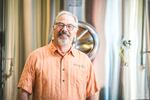
Larry Sidor is the co-founder and master brewer at Crux Fermentation Project in Bend. The company has added nonalcoholic beer to its regular lineup.
Courtesy Crux Fermentation Project
The Pacific Northwest helped pioneer craft brewing, and it’s still a hub for small breweries and small-batch distilleries. It should perhaps come as no surprise, then, that the region is also at the forefront of brewing and distilling nonalcoholic adult beverages like beer and spirits.
Larry Sidor is the co-founder and master brewer for Crux Fermentation Project in Bend. Sidor told “Think Out Loud” he spent decades in his former career working for big brewing companies like Pabst, Olympia, Hamm’s and Goetz making nonalcoholic beer. He wouldn’t recommend having one of those.
“It kind of tastes like scorched tomato juice,” he said.
But Sidor said that experience helped him enormously in being able to create the good-tasting nonalcoholic beers at Crux.
“I think the biggest thing is I learned what not to do,” he said. “I tried, you know, several methods, whether it was thin film evaporation or spinning combs, or distillation by fractionalization or arrested fermentation or different yeast varieties that don’t produce alcohol.”
You can’t expect to remove alcohol from a traditional beer and have it taste good, Sidor said. Instead, you have to brew a beer that never had it.
“Alcohol is a great solvent for many flavors, essential oils, that type of thing. And when you remove the alcohol, you tend to remove the solvent capabilities of the liquid. And so the real challenge,” said Sidor,“[is] to have a product that you produce that generates those flavors that you want without having to remove them.”
The industry is obviously starting to get something right. According to Crux, nonalcoholic beer accounts for 5% of the craft brew sales in Oregon, which is significant growth in the last few years.
Brad Whiting co-founded Wilderton Botanical Spirits, based in Hood River. They make flavors created without alcohol that can be used to make nonalcoholic cocktails or, as some like to call them, mocktails.
He attributes the growth in the nonalcoholic beverage category to consumers becoming more thoughtful about their alcohol intake and, more generally, a “drive towards a more balanced, more healthy lifestyle.”
Whiting said Wilderton’s spirits come in three basic categories: clear, brown and red, all of which have unique characteristics.
“We really had to use a new set of botanicals with a really novel extraction technique to deliver the same level of intensity, the same level of aromatic intensity that you’d find in a traditional spirit, but not trying to mimic any existing spirit,” Whiting said.
He said Wilderton is now part of the nonalcoholic cocktail menus at 200 bars and restaurants in Portland and Seattle.
The Adult Non-Alcoholic Beverage Association launched in the U.S. just over a year ago, another indication of this rapidly growing industry of nonalcoholic beers and botanical spirits.
Crux’s Larry Sidor said he continues to be pleasantly surprised by the demand. One recent example is the request that came in for kegs of nonalcoholic beer.
“I mean you know a bar or pub purchasing a keg of nonalcoholic beer is a pretty noteworthy situation,” Sidor said.
He added that if the demand for nonalcoholic beers is high enough to require kegs, that’s “pretty good writing on the wall.”
